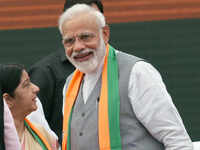Labour writes to PM May calling for UK to apologise for Jallianwala Bagh massacre
NAOMI CANTON | TNN | Apr 12, 2019, 23:10 IST Prime Minister of Great Britain Theresa May. (File photo: AP)
Prime Minister of Great Britain Theresa May. (File photo: AP)LONDON: The leader of the opposition in the UK, Jeremy Corbyn, has written to Prime Minister Theresa May asking the British government to make a full apology for the 1919 massacre at Jallianwala Bagh, Amritsar.
“It is not enough to condemn the massacre and express shame,” Corbyn wrote in his letter, referring to May’s comments on Wednesday, when she had said in the House of Commons, “The tragedy of Jallianwala Bagh in 1919 is a shameful scar on British Indian history.”
“In government, Labour would apologise for this shameful moment in our history,” Corbyn wrote.
“And as Sikhs across the globe celebrate the creation of the Khalsa and organise events for the first-ever UK Sikh Heritage Month, it is time for the UK government to address this formative moment in our shared histories and make a full apology for the massacre.”
The Sikh Federation UK, which leads on political engagement for the British Sikh community, had raised the same demand for an apology in its five-point plan prior to the 2017 snap election.
Corbyn wrote: “It is vitally important that the UK government apologises for this atrocity. The apology should be to the victims of the massacre, their families and descendants, the people of Punjab and the worldwide Sikh community.”
His letter dated April 11, 2019 states: “It is believed up to 1,000 people — predominately Sikhs but also Muslims and Hindus — died and 1,500 were injured when troops from the British Indian Army fired thousands of rounds at unarmed civilians, who had gathered for a peaceful protest and to mark a religious festival, Vaisakhi. The massacre came within months of the end of the Great War in which tens of thousands of turban-wearing Sikhs from Punjab sacrificed their lives for our freedom in Europe.”
Winston Churchill and former Prime Minister H. H. Asquith did openly condemn the attack ordered by Colonel Reginald Dyer, the acting military commander for Amritsar. Churchill called it “monstrous” and Asquith said it was “one of the worst outrages in the whole of our history”.
But in the House of Commons on Wednesday May only expressed shame and regret. Foreign secretary Jeremy Hunt is “reflecting” on the situation, Baroness Goldie told the House of Lords, after an apology was called for during a debate there in February.
“The UK government has had plenty of time to reflect on an appropriate response,” Corbyn wrote, in reference to that.
Labour British Sikh MP Tanmanjeet Singh Dhesi said: “I feel that it would be highly appropriate, especially as we mark the centenary, that the prime minister makes a formal apology on behalf of the nation for the 1919 Amritsar massacre. Many, especially the younger generation, would not be aware of this history, but it’s important that everyone knows, so that such an atrocity is never repeated. It was a crime against humanity when hundreds of innocent people were mercilessly killed and no British prime minister has formally apologised.”
But PIO London-based historian Dr Zareer Masani, whose BBC Radio 4 documentary on the massacre which he made in Amritsar, was broadcast this week, said the whole apology matter had become a “drama” for “some people to publicise themselves”. And he did not feel an apology was necessary. “Whilst I don’t think there has been any disagreement between historians on the facts of what happened there has been disagreement over the apology and some people are cashing in on it,” he said.
“Some people have climbed on the bandwagon calling for the UK government to apologise. They are doing it just to get publicity for themselves rather than encouraging people to look at what was a complicated situation at the time. I think an apology serves no purpose because you can’t apologise for something that happened 100 years ago from a government that is completely different to the one at the time when no one is still alive.”
He also claimed “there was an apology at the time”, referring to the Commons debate in which Churchill condemned the massacre and he pointed out that Dyer was forced to leave the army.
“It is not enough to condemn the massacre and express shame,” Corbyn wrote in his letter, referring to May’s comments on Wednesday, when she had said in the House of Commons, “The tragedy of Jallianwala Bagh in 1919 is a shameful scar on British Indian history.”
“In government, Labour would apologise for this shameful moment in our history,” Corbyn wrote.
“And as Sikhs across the globe celebrate the creation of the Khalsa and organise events for the first-ever UK Sikh Heritage Month, it is time for the UK government to address this formative moment in our shared histories and make a full apology for the massacre.”
The Sikh Federation UK, which leads on political engagement for the British Sikh community, had raised the same demand for an apology in its five-point plan prior to the 2017 snap election.
Corbyn wrote: “It is vitally important that the UK government apologises for this atrocity. The apology should be to the victims of the massacre, their families and descendants, the people of Punjab and the worldwide Sikh community.”
His letter dated April 11, 2019 states: “It is believed up to 1,000 people — predominately Sikhs but also Muslims and Hindus — died and 1,500 were injured when troops from the British Indian Army fired thousands of rounds at unarmed civilians, who had gathered for a peaceful protest and to mark a religious festival, Vaisakhi. The massacre came within months of the end of the Great War in which tens of thousands of turban-wearing Sikhs from Punjab sacrificed their lives for our freedom in Europe.”
Winston Churchill and former Prime Minister H. H. Asquith did openly condemn the attack ordered by Colonel Reginald Dyer, the acting military commander for Amritsar. Churchill called it “monstrous” and Asquith said it was “one of the worst outrages in the whole of our history”.
But in the House of Commons on Wednesday May only expressed shame and regret. Foreign secretary Jeremy Hunt is “reflecting” on the situation, Baroness Goldie told the House of Lords, after an apology was called for during a debate there in February.
“The UK government has had plenty of time to reflect on an appropriate response,” Corbyn wrote, in reference to that.
Labour British Sikh MP Tanmanjeet Singh Dhesi said: “I feel that it would be highly appropriate, especially as we mark the centenary, that the prime minister makes a formal apology on behalf of the nation for the 1919 Amritsar massacre. Many, especially the younger generation, would not be aware of this history, but it’s important that everyone knows, so that such an atrocity is never repeated. It was a crime against humanity when hundreds of innocent people were mercilessly killed and no British prime minister has formally apologised.”
But PIO London-based historian Dr Zareer Masani, whose BBC Radio 4 documentary on the massacre which he made in Amritsar, was broadcast this week, said the whole apology matter had become a “drama” for “some people to publicise themselves”. And he did not feel an apology was necessary. “Whilst I don’t think there has been any disagreement between historians on the facts of what happened there has been disagreement over the apology and some people are cashing in on it,” he said.
“Some people have climbed on the bandwagon calling for the UK government to apologise. They are doing it just to get publicity for themselves rather than encouraging people to look at what was a complicated situation at the time. I think an apology serves no purpose because you can’t apologise for something that happened 100 years ago from a government that is completely different to the one at the time when no one is still alive.”
He also claimed “there was an apology at the time”, referring to the Commons debate in which Churchill condemned the massacre and he pointed out that Dyer was forced to leave the army.
Download The Times of India News App for Latest India News.
Making sense of 2019
#Electionswithtimes
View Full Coverage

































All Comments ()+^ Back to Top
Refrain from posting comments that are obscene, defamatory or inflammatory, and do not indulge in personal attacks, name calling or inciting hatred against any community. Help us delete comments that do not follow these guidelines by marking them offensive. Let's work together to keep the conversation civil.
HIDE